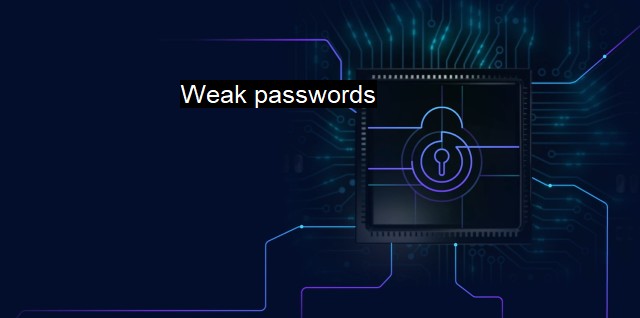What are Weak passwords?
Preventing Cybersecurity Risks: The Importance of Strong Passwords and Tips to Ensure Online Security
Weak passwords are one of the most common vulnerabilities present in cybersecurity. They often open doors for various forms of cyber-attacks such as identity theft, information leakage, defacing of websites, and interruption of services. Passwords are one of the main protections in digital communications, essentially functioning as locks on doors in a physical environment. Hence, a weak password is compared to a low-quality lock easy for anyone to break into. This issue, unfortunately, is widespread as a significant number of individuals and organizations do not prioritize a strong password.Before delving into the concept of weak passwords, it's important to understand what strong passwords are in light of cybersecurity principles. A strong password is one that is complex, difficult for others to guess, and unique for each account a user has. They usually encompass upper and lower case letters, numbers, and special characters. Such strength is checked against algorithms to ensure security. Strong passwords serve as the first line of defense in protecting sensitive information, preventing unauthorized access, and maintaining cybersecurity integrity.
On the contrary, weak passwords are easy to guess or crack. Some of the common traits of weak passwords include obvious patterns, sequences, or commonly used words. This could range from simplistic ones like "password", "123456", "abc123" or seemingly clever ones that use public shared information like dates of birth, names of loved ones, or even favorite sports teams. using the same password across multiple accounts increases vulnerability, considering one compromised account potentially leads the attacker to interlink other accounts tied to the weak password.
Weak passwords are an attractive and easy target for cyber attackers. Cybercriminals usually implement a technique known as "brute force attacks. It continually tries different combinations of passwords until the correct one is found. Therefore, simpler passwords can be cracked in a shorter time using brute force attacks. Brute force methods can initially attempt common words and phrases and move onto comprehensive and complex combinations if required.
In the broader context of cybersecurity and antivirus, weak passwords lead to a plethora of security risks. Unauthorized access can potentially jeopardize the integrity, confidentiality, and availability of data and systems. Hackers armed with malicious intent can steal personal information such as financial details or manipulation works for their benefit. once inside a network, they can introduce malware that damages or locks systems until a ransom is paid.
Antivirus software plays a significant role in this realm by providing additional layers of protection against cyber threats. these security devices are rendered less effective if the basic security principle of strong password culture is not upheld.
Weak passwords pose a serious challenge to cybersecurity. The use of complex, unique passwords may seem cumbersome to users, who often value convenience over security. given the increasing cyber threats, users need to prioritize strong password protocol to protect their sensitive information and overall digital security. This rally for stronger passwords needs to rise beyond individual users to the realms of organizations, where shared systems may house multiple troves of sensitive data, warranting high levels of cybersecurity measures. Addressing the problem of weak passwords brings us a step closer to fostering a safer digital environment for all.

Weak passwords FAQs
What is a weak password?
A weak password is a password that is easy to guess or crack, typically composed of simple or common words, numbers, or patterns. Weak passwords put your cybersecurity at risk, as it can be easily broken by malicious hackers or computer viruses.Why should I avoid using weak passwords?
Using weak passwords can expose your personal and sensitive information to cybercriminals, who can steal your data, infect your device with malware, or even hijack your online accounts. Strong passwords are an essential measure to protect yourself and prevent potential security breaches.What are some tips for creating strong passwords?
To create strong passwords, you should use a combination of upper and lower-case letters, numbers, and special characters, and avoid using personal information or common words. It's also recommended to use a unique password for each of your online accounts, and regularly update your passwords to enhance your cybersecurity.How can I check if my password is strong enough?
There are several online tools and services that can test the strength of your password, by analyzing its length, complexity, and uniqueness. Some antivirus software also includes a password manager that can help you generate and store strong passwords securely. Additionally, you can use multi-factor authentication (MFA) to add an extra layer of protection to your accounts.| | A | | | B | | | C | | | D | | | E | | | F | | | G | | | H | | | I | | | J | | | K | | | L | | | M | |
| | N | | | O | | | P | | | Q | | | R | | | S | | | T | | | U | | | V | | | W | | | X | | | Y | | | Z | |
| | 1 | | | 2 | | | 3 | | | 4 | | | 7 | | | 8 | | |||||||